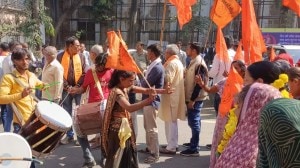Centre agrees to extent deadline for Bru resettlement in Tripura
Around 37,000 Bru migrants from Mizoram are to be resettled in Tripura. The migrants have been living in the state for the last 25 years.
 The Bru people are eating puffed rice, which has been distributed by different NGO'S, Churchs (Express photo/file)
The Bru people are eating puffed rice, which has been distributed by different NGO'S, Churchs (Express photo/file)After a meeting with Union Home Minister Amit Shah in New Delhi on Tuesday, Tripura Chief Minister Dr Manik Saha said Shah has agreed to extend the permanent resettlement programme. While no specific deadline has been fixed, the move came days after the August 31 deadline could not be met.
Around 37,000 Bru migrants from Mizoram are to be resettled in Tripura. The migrants have been living in the state for the last 25 years. These migrants, who fled their homes in Mizoram in 1997 following an ethnic tension, are the largest group of people to have survived protracted displacement in the region.
Speaking to the media, Saha said, his government is resettling Mizoram’s Bru migrants in Tripura in a decent manner and the extension was sought because a few migrants are still unaccounted for in government records. “The last date for the Bru resettlement expired on August 31 this year. The deadline was a part of the quadripartite agreement signed between the Government of India, state governments of Mizoram and Tripura and the Bru migrants in January, 2020.”
Saha added, “We had a meeting with the Union Home Minister on this issue. We have already informed him and placed all details of the Bru resettlement programme before him. There are some people (among the Bru migrants) who have gone outside for treatment, some have gone back to Mizoram, some also came to Agartala. We feel the door (of resettlement) should be kept open for them too.”
As many as 3,696 of the 6,959 Bru migrant families living in Tripura have already been resettled while construction of houses to resettle the rest of the 2,407 migrant families is on at 12 locations approved by the government.
As a part of a Rs 600-crore package announced to resettle them, the Bru migrants will be given free ration and Rs 5,000 sustenance dole each family every month for two years. A Rs 1.5 lakh one-time financial support and Rs 4 lakh for constructing permanent houses will also be given to the families.
The Bru resettlement process started in April 2021. Bru migrant leaders had earlier urged the Centre to expedite the resettlement process. Speaking to indianexpress.com, Mizoram Bru Displaced Peoples Forum (MBDPF) general secretary Bruno Msha said the resettlement process is on but in many places, migrants are yet to be fully resettled. He added that nearly 700 Bru families haven’t been recognised in the state government-approved list of beneficiaries prepared as per a survey conducted in 2020.
Bruno sought the government to include those who were left out of the beneficiary list and allow resettlement in locations of North Tripura district previously agreed by the government. While many migrants are being resettled in other districts at government-approved resettlement colonies, Bruno said there are many locations in North Tripura district where migrants can be resettled.
In a statement, Tripura BJP media in-charge Sunit Sarkar welcomed the Centre’s move to extend the Bru resettlement deadline and said, “The MHA has agreed to extend the deadline to resettle Bru migrants on a special request of Tripura Chief Minister Dr Manik Saha. This is proof of the goodwill of central and state governments. People of the state are getting the benefits of a double engine.”
Tripura BJP president Rajib Bhattacharya hailed the decision and expressed hopes for a smooth Bru resettlement. As many as 37,000 Bru migrants escaped the ethnic clashes in Mizoram in 1997 and were sheltered in six relief camps in North Tripura district. Nearly 5,000 returned in nine phases of repatriation but almost the same number returned after renewed clashes in 2009 and came to Tripura.
Twenty-five years after this protracted displacement which has become the largest internal displacement in northeast India so far, an agreement was signed on January 16, 2020 to permanently resettle them. The pact came two years after another agreement in June 2018 which sought to repatriate them to Mizoram, which was rejected by the migrants saying they were not “properly consulted”.



- 01
- 02
- 03
- 04
- 05




























